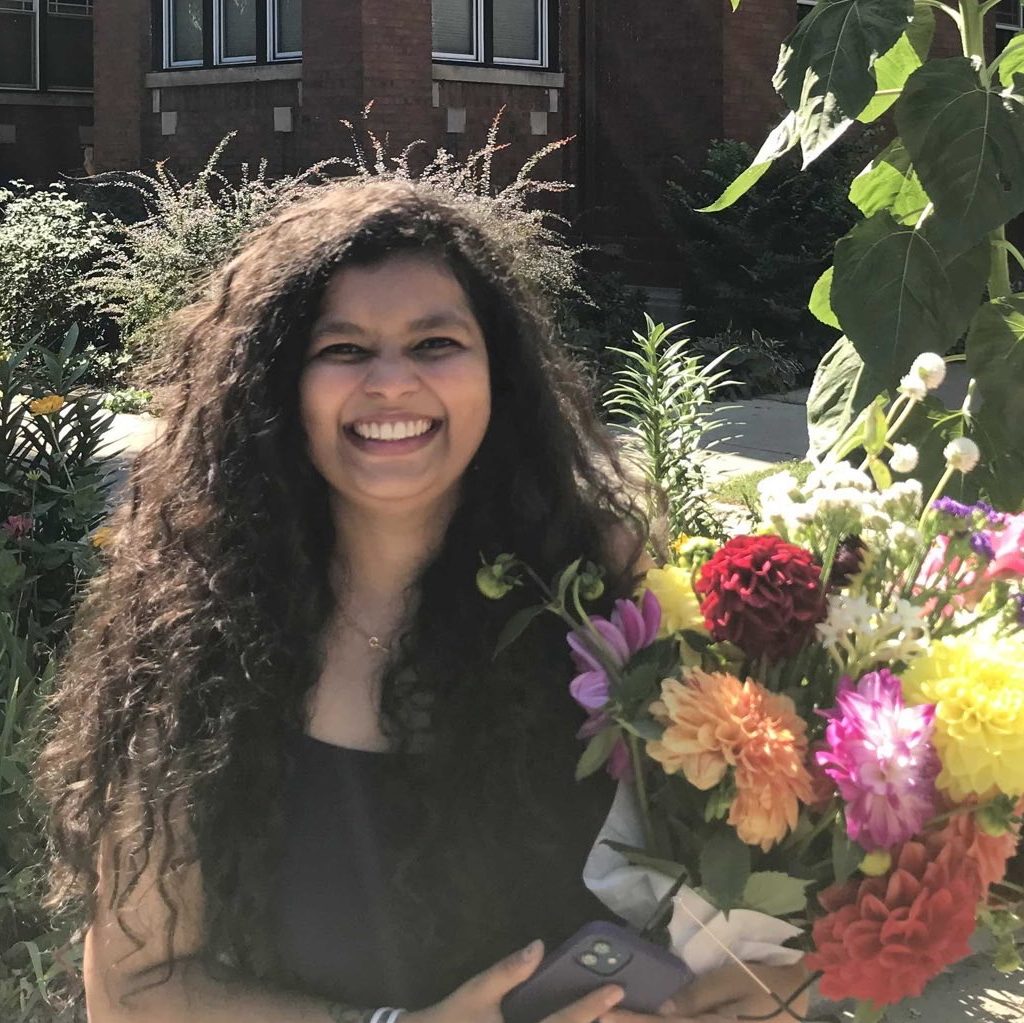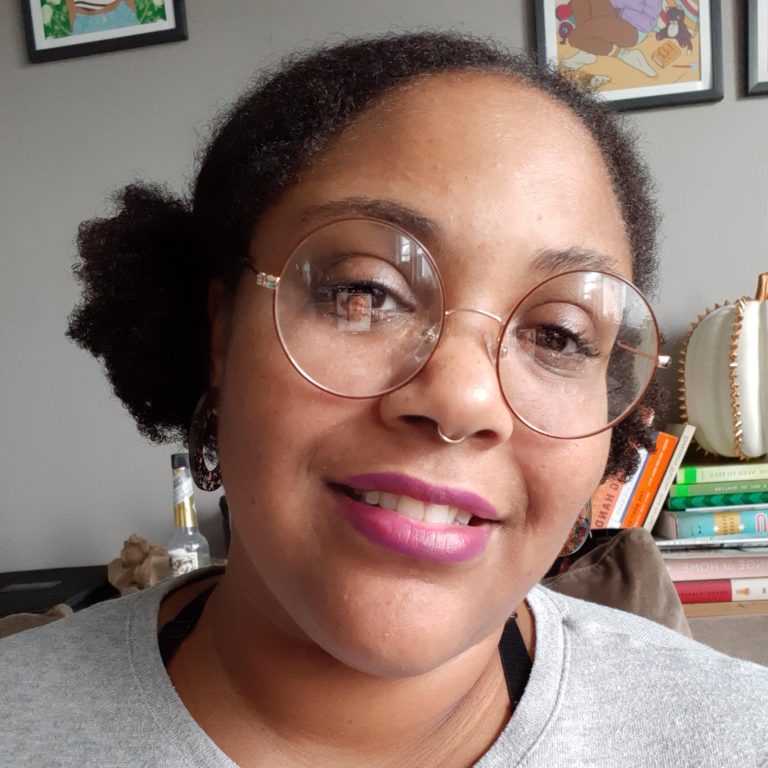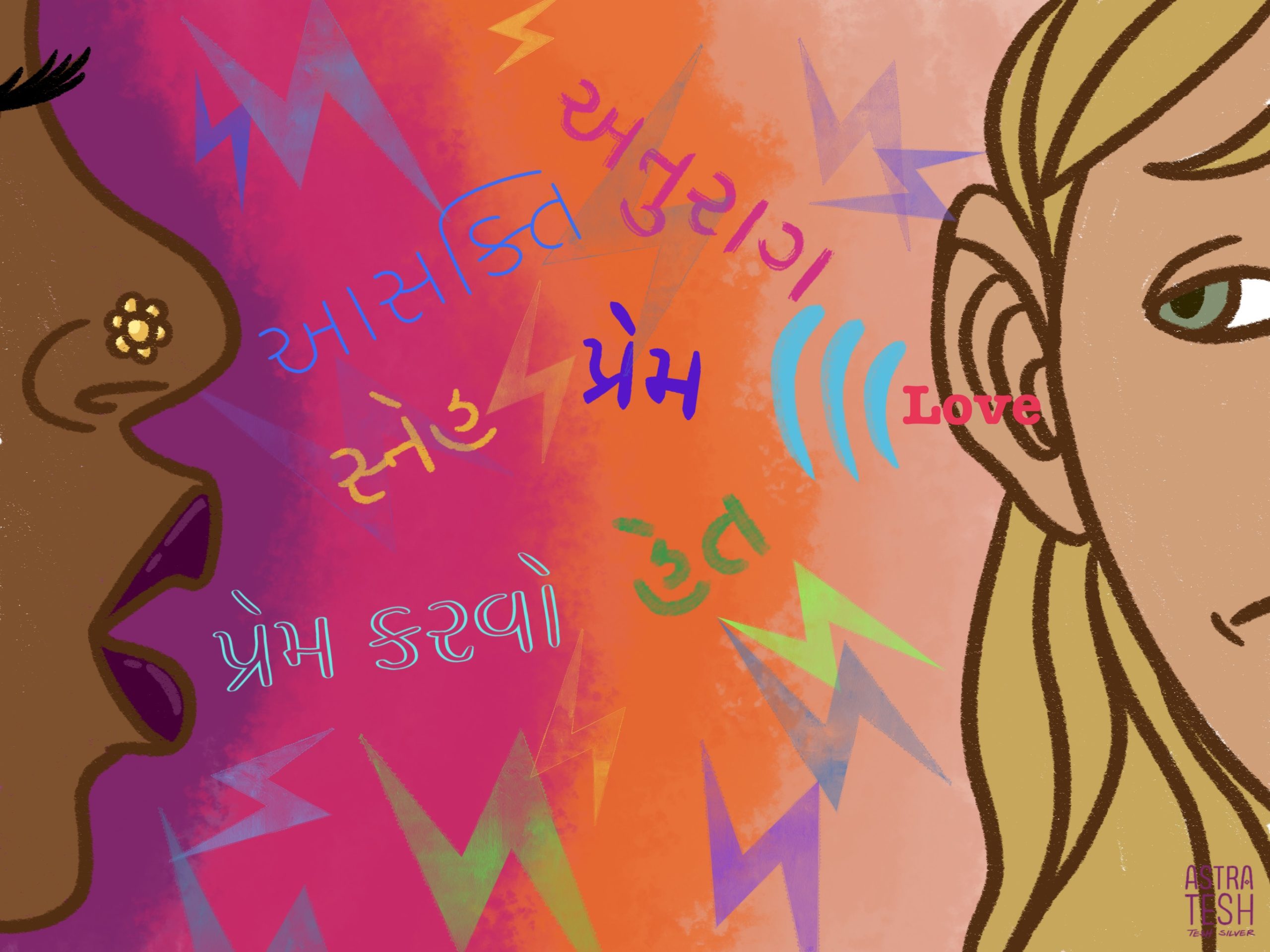
1. My first language should be Gujarati. Back home in India we categorize languages as–mother tongue, national language and English. Studying, speaking, and thinking in English is a privilege reserved for the upper middle class and/or upper middle caste. My first language was not always English; but I have no recollection of thinking in any other language. I do know that I switch to speaking in Gujarati as soon as I talk to my parents. But if I start paying attention to what I am saying, words start disappearing and I struggle to make meaning.
All this to say that the only language I think in, is English. But the language I love and pray oscillates between Hindi, Gujarati, and English which makes it really hard to build a life here in Chicago, where I have been for the last 5 years. This is where I plan to stay. I left home at 17– women who knew life, love, relationships, lingerie, eyeliner, and sex adopted me and people I loved spoke Hindi; they taught me it meant staying up until 4AM watching vampires eating humans, or encouraged me to dance to pop songs in Hindi on repeat even when I protested, “Too uncool–these songs,” but we danced anyway. Growing up in an increasingly Americanized post-colonial India, my status depended on assimilating through English – a language I know like the back of my hand.
“My first language was not always English; but I have no recollection of thinking in any other language. I do know that I switch to speaking in Gujarati as soon as I talk to my parents. But if I start paying attention to what I am saying, words start disappearing and I struggle to make meaning.”
I intellectualize in English. Ask. Know. Argue. Write, Think, Sing songs in this language. Nothing has made as much sense to me. Nothing has felt more like the truth than the fact that I was never going to stay in India. It was written in my birth chart Janmakshar / જન્માક્ષર (Gujarati.) Someone I don’t know wrote in a folder square paper that I was destined to not stay, to leave home and make life elsewhere. I grew up hearing this from every person I know, and so it only made sense that this was my truth; I knew it. When my parents wanted to show their friends and family how impressive their child was, I sang “My heart will go on” pitch perfect without an ounce of my Indian accent.
“The language in which I love refuses to let a word be a word, an emotion be one single thing.”
No wonder the dissonance also rang true. I sang in English but I come from people who spontaneously burst into dance when they are happy. ShahRukh Khan wala pyaar / शाहरुख़ खान वाला प्यार / a love like the one in a ShahRukh Khan movie. The language in which I love refuses to let a word be a word, an emotion be one single thing. Romantic love becomes bigger than itself. It is the kind of love where your family means more and just as much as the lover; when relationships mean your family is theirs, you take care of everyone you know. Learning to communicate and access and convince and address and worry about and stress over everyone who you’re accountable to. They will remind you – you are accountable to your friend, and their parents, and their siblings, and vice-versa. There is no one person buying lunch; I cannot feed just myself, until everyone else is also going to be fed. This kind of expansiveness is what allowed me to access a family bigger than my blood; friendships become family and blood becomes nothing more than red. Think beyond the individualism so dear to the American economy. No wonder the dissonance keeps ringing true.
2. जुगाड़• jugaad • Origin: Hindi • Improvised to be affordable or easy; but it really means contrivance, stratagem, intrigue, innovative or irregular way of repairing, or mending something or such a mechanism or device, a make-shift device or solution to a problem.
In December 2019 and early 2020, I was safely tucked away in Chicago google-map-detecting all movement for friends and organizers in the leadership for the Citizenship Amendment Act protests in Ahmedabad, Delhi, and Patna, India. Indians across the country and abroad were protesting the new ways in which the current government would strip Muslims of their citizenship in the name of protection. Earlier the same year, India had stripped Kashmir of its independent statehood and cut off all internet access, and men in power joked about marrying and raping Kashimiri women as a way of taking over land and legacies written in the Indian constitution. The government had started something called an ITcell, promising low wage jobs to the young people in India to track social media, conversation and any online activity from activists in India organizing protests. Two community members protesting were arrested immediately for 18 months to make an example of. Comedians lost their gigs. Teachers writing anti government opinions on Facebook and Twitter shamed into quitting their jobs.
I was a writer and editor at Fnews Magazine back then. I was here, in the United States. My phone was not being tracked, my Facebook statuses were not being monitored. I wrote about Kashmir, posted every protest and its map, any article that would help explain what was happening and what to do. For every time I wrote on Twitter, there were atleast a few murder and rape threats. Some comments about me being asanskari / असन्स्कारी (uncivilized) and देशद्रोही a traitor to the country.But this isn’t a story about just me.
For a population of 1.408 billion in countries like mine, social media has been quick to percolate. We live through Whatsapp and Facebook and Twitter and Instagram. Organizing happens through here, and also trolling. Trolling is a small word for what can only be called abuse. Women, anyone who is Muslim, the queer community, and trans community–most of us keep our comment sections fully secure. Abuse, threats, and insults seep into every post in one of the 400 languages spoken.
“There is no abuse detection.”
Screenshots from from journalist Rana Ayyub’s Twitter post:
Translation according to Instagram :
Note: no abuse detection.
This translation is not accurate. The comment calls Rana Ayyub a whore and mistress of the West because she writes for the Washington Post. They are also threatening to buy her if she spoke too much. This is one of the hundreds of comments on one single post. They exist, in public, for anyone to see. There is no abuse detection. There is a colonization of the language, of the safety systems of the platforms themselves. The United States prioritizes making money in our countries, but they don’t protect the people whose money and ad revenue bring the numbers in.
I like to think of it as the underground; a lot passes its way into the colonized landscape of social media and technology. It is built in the West by approximately 175,000 Indians working in the Silicon Valley in California. We build the apps, the software, work on the same technology that lets us talk to people we love, melt between languages, and talk trash without being recognized. There is a glaring gap but we don’t talk about it. It pays the bills. It keeps us connected.
3. There is a word we like to use a lot in Hindi – Jhelo / झेलो. It means ‘take it / bear it.’ We use it when the benefits of something in the long term outweigh the discomfort of now. But ‘discomfort’ is political. The right to comfort is reserved for the powerful. We, the users keep the technology around and take the abuse, the threats, the violence because it also is how we speak, talk, organize and unionize. Underground worlds are built in the same languages that slide right past any form of detection on social media.
The current ruling party in India–fascist without debate, in 2020 elections appointed 9,500 IT cell heads, 72,000 WhatsApp groups to spread propaganda, surveil organizers’ social media presence, throw hate comments, insults, and pass on the names to police who currently have the right to designate individuals as terrorists without following any formal judicial process for writing, organizing, or making fun of the current government. Social media apps have the ability to detect nipples as vulgar but cannot speak any other language. What a lot of us forget about in the one-size-fits-all social media world is facts like these.
Investigative journalist and editor Ravish Kumar in his book “The Free Voice” talks about TV programs that proliferate on Youtube where godmen peddle murder and rape at their worst, ask families to keep menstruating women out of kitchen and temples on good. There are no language laws. Just enough money to sign up, get ad revenue, and make countries where this is popular content, sign up for their services. Whatsapp added a ‘forwarded multiple times’ tag on their service to warn people from reading fake news, did it work? Who is measuring? Who is keeping track of how language passes through?
“I say I love you every time I fail to actually be vulnerable; Pray that they forgive me. Know I am here and trying. Unable to actually ask for फुर्सत / time, capacity, space, freedom.”
Just like this article, I am writing in English, I can also write in Hindi by using the English alphabet and nothing is set up to detect what I am saying. I can as easily type out the alphabet in any language and send you love letters, hate mail, and this is how we live – sliding under the radar of what also makes sure I can see the faces of my family from anywhere in the world.
4. The people I love, love in multiple languages. Sometimes when my phone rings, I freeze. My brain stumbles onto language and tone and meaning and even presentation—I cannot truly pick that phone up, or see them until I can grasp what language to show up in—reach the language they talk in; meet my people where they are at. I hide behind the intellectualization I hold so deeply to keep me safe. I say I love you every time I fail to actually be vulnerable; Pray that they forgive me. Know I am here and trying. Unable to actually ask for फुर्सत / time, capacity, space, freedom. Or love that allows for being a child, and a caretaker, and submissive, and demanding, and playful, and angry, and irritated, and also wanting to be hugged; I want the barkat / बरकत kind of love, the hasrat हसरत kind of shushed, whispered desire, and longing.
The longing I feel for a father I haven’t seen in 4 years is not as simple as longing. It is grief and anger and helplessness, and if I could call it one thing, I’d call it dheet / ढीट. The word means stubborn, but is used for someone you love. You’re stubborn and I still love you. You cause me pain and I love you. We cajole the pain till it lessens.
5. In more than one way, there are people who have helped me figure out how to love better. One kind of love, gets not only the ability, but the right to take my name and bend it to what feels more like me. N calls me Darshi. S and U call me Darshu, but it’s different when S calls me Darshuuuuuuuu. She asserts her love, and her right, and her ownership of this version of me that only she gets. Her son–will grow up calling Darshu Maasi / मासी (maasi means someone like mother, mother is maa / मां). My parents call me Dularee, never Darshita. An aunt who recently passed away, called me a different name for different moods. She would lovingly shout Dulo if I did something that made her proud or angry, Duli if she needed my help. Versions of me are scattered across India. Here in the US I am just Darshita. Flattened to being asked the correct pronunciation of my name. Stuck in the politics of the meaning. Fixated on getting that correct. I am okay, used to uprooting this way but here people are my new friends, my new family, new people who are way more scared to pronounce my name wrong than to try to assert their love by changing my name. But that’s a whole different story.
“The longing I feel for a father I haven’t seen in 4 years is not as simple as longing. It is grief and anger and helplessness, and if I could call it one thing, I’d call it dheet / ढीट. The word means stubborn, but is used for someone you love. You’re stubborn and I still love you. You cause me pain and I love you. We cajole the pain till it lessens.”
6. Right now I make do with small pockets of whatever language I breathe in between work and family and grief and immigration, and paperwork. Screenshot love. Laughter across facetime; group call family; we speak in Gujarati and pretend to be Hansa from Khichadi on Halloween. Western festival with no recognition of this iconic character I am playing. I revel in the joy of passing by undetected. Grieve the lack of camaraderie.
We don’t talk about that enough. How what protects us can also be our undoing. What this language that abuses me, undetected, also does to keep me in this country. Grieving a romanticized version of a life back home, because that is the trick of this country. It keeps you here comfortable but grieving. Alive but empty. Surviving. Just enough to want to keep breathing. The more relationships I build in English the more I feel an abyss of what keeps feeling unseen. Or unfelt, or unspoken – I know what I want to say, I know what I mean, I know the exact words, they just don’t exist in English. It takes too many words, too many examples, too much time–space I am still learning to take up. The language itself locks me into the need to stay small.
A lot of us expand sideways, take on more words from all our languages and bring them here. Like the food and shoes outside our homes and spices smuggled into seeds of disbelief. Just like that–khamakha / खामखा. Khwah-ma-khwah; Khamakha means without reason, lovingly means you take on more than you need to or can take on. I cannot translate that in one single word or one single meaning. I am learning to refuse to.
7. Twitter made 1.57 billion in India in 2021-2022. Facebook and Instagram adds 10 million users every 9 months in India. India has the largest number of WhatsApp users, estimated at 487.5 million. India has a total of 399 registered languages, not counting the dialects and slang. These are all under-radar of this surveillance technology, thriving in their own laughter. A wink and a nod across an American room when you hear someone say a word in Hindi. We understand each other. Pass without detection: in solidarity and hatred.
Am I saying I want someone to detect abuse in languages we use? No. That would censor and take away from the freedom to love the way I do, fight and ask for, and explain the way I need to. We all need to. So what am I saying? I am not saying one single thing. I am pleading that this is more than just one thing. We pay a cost to be ourselves, and to be loved expansively. One form of it is abuse. One is distance. One is what goes missing when you translate. There are more.
I want to be called ढीट / dheet / stubborn by my father and not know it as abuse. I want to be called yaar /यार and know they mean long lost friends who are also family. When do we expand our methods of communication to the expansiveness of language? When did we understand English as the only language in communication?
“I am afraid to be confused in this language where water has only one word; forest is only forest, and lover can only be loving, not childlike, angry, forgiving, jealous, challenging, lustful, sinful and comfortable.”
So what am I saying? I am saying that I am afraid.
I want to demand protection for my relationships and my opinions and my feelings. I want to demand care built into systems, not censorship. I want inclusion for the people writing this software to also be able to write in their own languages. I am afraid to be confused in this language where water has only one word; forest is only forest, and lover can only be loving, not childlike, angry, forgiving, jealous, challenging, lustful, sinful and comfortable. I am asking to be liquid. I am afraid to fall in love in this country. I don’t know how to say what I mean. I don’t have the words to. I demand fluidity. I demand expansive meaning making tools to think and speak, demand and imagine, and reimagine.
I leave it here. A word I deeply love:
دہلیز • dehleez • /d̪ɪhliz/ • (noun, fem.) • threshold, entrance of a home. This is an Urdu word. In poetry, it is often used to reference the threshold of a feeling or experience. A limit, a frustration and also a request.

About the author: Darshita Jain is a Chicago-based poet, art critic, arts administrator, and a voracious consumer of content, matched only by her need to converse critically about the said content. Her work takes the shape of exhibition direction, art journalism, writing, performance, and non-profit arts administration. She received her MA in New Arts Journalism at the School of the Art Institute. Darshita has been writing and developing tools to educate and build a critical lens to life and culture for the last 8 years. She currently works as the Director of Outreach and Artist Programs at Lillstreet Art Center in Chicago.

About the illustrator: Teshika Silver is a freelance illustrator, designer, teaching artist and spiritual cultural worker spending time and living freely in Washington Park, Chicago. Follow her work on Instagram @astratesh.



